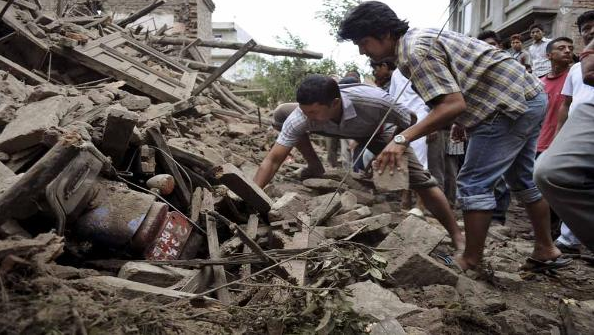Quake Toll Crosses 7000, Thousands Missing, Nepal Red Tape Stalls Aid And Relief
Nepal struggles to rebuild itself...

NEW DELHI: The death toll following the devastating 7.8 magnitude earthquake in Nepal has crossed 7000, with thousands still missing. As the country struggles to cope, the Nepal government has come under fire for allegedly obstructing the flow of aid to the country.
According to reports in local media, hundreds of tonnes of aid has been stalled at the Indian border. On Friday, UN resident representative Jamie McGoldrick warned the government to loosen custom restrictions, after reports indicated that Nepal had exempted only tarpaulins and tents from import taxes. They should not be using peacetime customs methodology,” Goldrick said (as quoted in The Guardian).
Suman Prasad Sharma, the Nepali finance secretary, denied the charges. “We haven’t sent back anything, and there’s no duty to pay on anything. These charges are completely irresponsible and I refute them,” Sharma said (as quoted in The Guardian).
McGoldrick connected this delay to bureaucratic bottlenecks. “The bottleneck was the fact that the bureaucratic procedures were just so heavy… So many layers of government and so many departments involved, so many different line ministries involved. We don’t need goods sitting in Kathmandu warehouses. We don’t need goods sitting at the airport. We need them up in the affected areas,” he said (as quoted in The New York Times).
Minendra Rijal, the minister for information and communication and the government’s official spokesman, denied that the government had slowed any delivery of aid. Quoted in The New York Times, Rijal said, ““The accusations are false… It would be better if the U.N. involved itself more in its duties rather than engaging in criticizing the government,” Rijal said in a phone interview with NYT.
Meanwhile, the only international airport in the country was shut to large planes carrying aid because of damage to the runway. "You've got one runway, and you've got limited handling facilities, and you've got the ongoing commercial flights," McGoldrick said, according to the Associated Press. "You put on top of that massive relief items coming in, the search and rescue teams that have clogged up this airport. And I think once they put better systems in place, I think that will get better."
“We feared that the possible damage of our only international airport would invite further problems in the post-quake scenario, so the landing of heavy planes has now been restricted,” said Birendra Prasad Shrestha, the airport’s acting general manager, to NYT.
As criticism mounts on the distribution of aid, estimates indicate that a lot of assistance is needed. Ram Sharan Mahat, the Nepalese finance minister, said it at least $2bn would be needed to rebuild the country. “This is just an initial estimate and it will take time to assess the extent of damage and calculate the cost of rebuilding,” Mahat said. Other numbers estimating the cost of reconstruction are even higher, with ancient monuments, artefacts and buildings having been destroyed.
The Red Cross has said that towns and villages near the epicentre have suffered “almost total devastation" with rescue teams working hard to reach the remote areas affected by the quake. Accessibility bottlenecks in the form of poor roads and bad weather have hampered efforts to reach isolated villages.
As criticism regarding the government’s response mounts, the political crisis escalates with opponents questioning the competency and leadership of Nepal’s Prime Minister Sushil Koirala -- who was away at a summit in Indonesia when the earthquake struck.
Leading the charge is the opposition -- the Maoists. A spokesperson for the United Communist Party of Nepal Maoist (UCPN-Maoist), Dinanath Sharma, castigated the Prime Minister for “showing an insensitive attitude at this time of great national loss” (as quoted in WSJ).
The Prime Minister’s camp responded, with spokesperson Prakash Adhikari that the criticism was “unwarranted” and that Koirala was “doing all he can with available resources” (as quoted in WSJ).
The fact that Nepal is reliant on international aid to cope with the disaster, pouring in from neighbours India, China, the US, EU and other countries, has also become a bone of contention. UCPNM spokesperson Sharma, quoted in WSJ, says that this reliance on international aid instead of being able to take care of itself “is a matter of great shame.”



